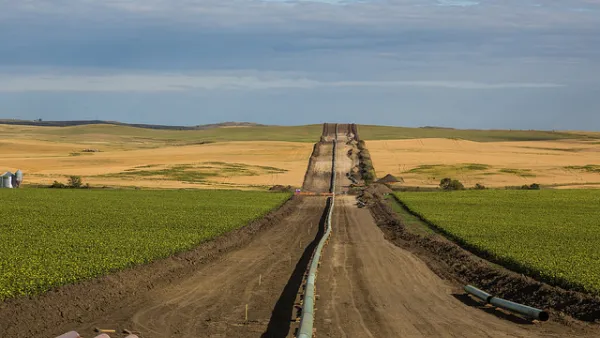A federal judge ruled that the Army Corps of Engineers failed to fully comply with NEPA in allowing the controversial pipeline to cross under the Missouri River. The judge did not order Energy Transfers Partners to cease operations of the pipeline.

"A federal judge in Washington, D.C., has ruled that the Trump administration failed to follow proper environmental procedures [under the National Environmental Policy Act] when it granted approval to the controversial Dakota Access Pipeline project," reports Merrit Kennedy for NPR.
It's a legal victory for the Standing Rock Sioux tribe and environmentalists, who protested for months against the pipeline. Oil started flowing through it earlier this month. The tribe fears that the pipeline, which crosses the Missouri River just upstream of their reservation, could contaminate their drinking water and sacred lands.
"In a 91-page decision [pdf], Judge James Boasberg wrote, 'the Court agrees that [the Corps] did not adequately consider the impacts of an oil spill on fishing rights, hunting rights, or environmental justice, or the degree to which the pipeline’s effects are likely to be highly controversial,'" states the press release from Earthjustice, the nonprofit, environmental law firm that represents the Tribe.
The Court did not determine whether pipeline operations should be shut off and has requested additional briefing on the subject and a status conference next week.
"This decision marks an important turning point. Until now, the rights of the Standing Rock Sioux Tribe have been disregarded by the builders of the Dakota Access Pipeline and the Trump administration—prompting a well-deserved global outcry,” said Earthjustice attorney Jan Hasselman. “The federal courts have stepped in where our political systems have failed to protect the rights of Native communities.”
On January 24, President Trump signed a Presidential Memorandum Regarding Construction of the Dakota Access Pipeline (posted here), reviving the project that was halted in December by the Army Corps of Engineers.
This is a major victory for the Tribe and we commend the courts for upholding the law and doing the right thing," Standing Rock Sioux Chairman Dave Archambault II said in a statement. "The previous administration painstakingly considered the impacts of this pipeline, and President Trump hastily dismissed these careful environmental considerations in favor of political and personal interests..."
About the 'other' pipeline
On the same day that Trump signed the memo to expedite construction of the Dakota Access Pipeline, he also signed a memo doing the same for the Keystone XL pipeline, specifically from Alberta, Canada to Nebraska.
On March 24, the State Department signed and issued a Presidential Permit to authorize construction. Permits are in place for Montana and South Dakota, but not Nebraska, reported Mitch Smith for The New York Times in April. The Nebraska Public Service Commission continues to hold hearings on the pipeline.
FULL STORY: Judge Delivers Blow To Trump Administration In Dakota Access Fight

National Parks Layoffs Will Cause Communities to Lose Billions
Thousands of essential park workers were laid off this week, just before the busy spring break season.

Retro-silient?: America’s First “Eco-burb,” The Woodlands Turns 50
A master-planned community north of Houston offers lessons on green infrastructure and resilient design, but falls short of its founder’s lofty affordability and walkability goals.

Delivering for America Plan Will Downgrade Mail Service in at Least 49.5 Percent of Zip Codes
Republican and Democrat lawmakers criticize the plan for its disproportionate negative impact on rural communities.

Test News Post 1
This is a summary

Test News Headline 46
Test for the image on the front page.

Balancing Bombs and Butterflies: How the National Guard Protects a Rare Species
The National Guard at Fort Indiantown Gap uses GIS technology and land management strategies to balance military training with conservation efforts, ensuring the survival of the rare eastern regal fritillary butterfly.
Urban Design for Planners 1: Software Tools
This six-course series explores essential urban design concepts using open source software and equips planners with the tools they need to participate fully in the urban design process.
Planning for Universal Design
Learn the tools for implementing Universal Design in planning regulations.
EMC Planning Group, Inc.
Planetizen
Planetizen
Mpact (formerly Rail~Volution)
Great Falls Development Authority, Inc.
HUDs Office of Policy Development and Research
NYU Wagner Graduate School of Public Service





























